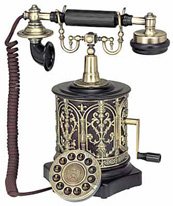If Telephone changed our lives just imagine what #BlockChain #techonolgy will do in near future.
World Changes Due to the Telephone

Within 50 years of its invention, the telephone had become an indispensable tool in the United States. In the late 19th century, people raved about the telephone's positive aspects and ranted about what they anticipated would be negatives. Their key points, recorded by Ithiel de Sola Pool in his 1983 book "Forecasting the Telephone," mirror nearly precisely what was later predicted about the impact of the internet.
For example, people said the telephone would: help further democracy; be a tool for grassroots organizers; lead to additional advances in networked communications; allow social decentralization, resulting in a movement out of cities and more flexible work arrangements; change marketing and politics; alter the ways in which wars are fought; cause the postal service to lose business; open up new job opportunities; allow more public feedback; make the world smaller, increasing contact between peoples of all nations and thus fostering world peace; increase crime and aid criminals; be an aid for physicians, police, fire, and emergency workers; be a valuable tool for journalists; bring people closer together, decreasing loneliness and building new communities; inspire a decline in the art of writing; have an impact on language patterns and introduce new words; and someday lead to an advanced form of the transmission of intelligence.
Privacy was also a major concern. As is the case with the Internet, the telephone worked to improve privacy while simultaneously leaving people open to invasions of their privacy. In the beginning days of the telephone, people would often have to journey to the local general store or some other central point to be able to make and receive calls. Most homes weren't wired together, and eavesdroppers could hear you conduct your personal business as you used a public phone. Switchboard operators who connected the calls would also regularly invade people's privacy. The early house-to-house phone systems were often "party lines" on which a number of families would receive calls, and others were free to listen in and often chose to do so.
Today, while most homes are wired and people can travel freely, conducting their phone conversations wirelessly, wiretapping and other surveillance methods can be utilized to listen in on their private business. People's privacy can also be interrupted by unwanted phone calls from telemarketers and others who wish to profit in some way - just as Internet e-mail accounts receive unwanted sales pitches, known as "spam."
Yet, the invention of the telephone also worked to increase privacy in many ways. It permitted people to exchange information without having to put it in writing, and a call on the phone came to replace such intrusions on domestic seclusion as unexpected visits from relatives or neighbors and the pushy patter of door-to-door salesmen. The same could be said for the Internet - privacy has been enhanced in some ways because e-mail and instant messaging have reduced the frequency of the jangling interruptions previously dished out by our telephones...